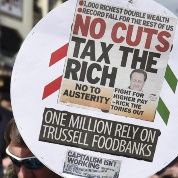The 2015 elections will mark a watershed for the countries of the United Kingdom but why should the world care?

It could mean the end for the U.K. in Europe.
In a maneuver bowing to the pressure the anti-Europe UKIP party put on the party’s more hardline members, the Conservatives promised a referendum on whether or not the U.K. should pull out of the EU during their next term, should they win. A YouGov poll this February showed that 35 percent of Brits would currently vote to leave the EU, with 45 voting against a pullout, however, as this election has shown, polls can be wrong and the British press can be powerful. Journalist Richard Seymour, of Lenin’s Tomb, analyzed this power for teleSUR’s “Media Review” in the run-up to the elections.
Stronger backing for austerity.
The Conservatives have been ruling for the rich rather than the electorate for five years already and they are likely to cut deeper into Briton’s welfare benefits, forcing even more into poverty than at present. Austerity, U.K.-style has already seen rising child poverty, a huge leap in the use of food banks and zero rises in investment in the National Health Service, while cuts in doctors and nurses has translated, unsurprisingly, to a worse service. The Conservatives are hell-bent on neoliberalism and privatization. The last of the U.K.’s world-respected state-run institutions will almost certainly see nails sealing the coffins of the National Health Service and state-run schools tightly shut. Why does this matter to the world? Great beacons of hope and examples of good state-run institutions will be lost to inspire other capitalist countries to reform and change for the good of their people.
But the beginning of a new anti-austerity movement?
The Conservatives failed to increase their share of the vote; it hovered at around 36 percent: hardly a majority in terms of vote share, although a slim one in terms of seats. In contrast, the anti-austerity Scottish National Party’s huge new mandate should boost those fighting austerity in Europe. The anti-austerity Greens also increased their vote four-fold.
Though Labour’s vote share fell six percent nationally, those Labour parliamentarians who spoke out against austerity and inequality actually saw their share of the votes increase, such as Jeremy Corbyn (whose share of the vote went up by 5.8 percent), Diane Abbott (7.9 percent) and John McDonnell (up 4.7 percent). McDonnell tweeted “let's be clear, it was a party standing on anti austerity ticket that swept the board.” In austerity, the Left may have finally found a uniting factor, which could help it grow stronger.
Neoliberal free trade agreements will get the go-ahead.
There are some big free trade deals coming up — including the Trans-Atlantic Trade and Investment Partnership, known as TTIP — that will allow U.S. companies to storm into Europe with their secretive investor-state dispute mechanisms, which put the rights of companies over states or citizens. Nongovernmental activist organization 38 Degrees published this quote from the Conservatives regarding the TTIP: “The TTIP is part of our long term economic plan to secure a better future for Britain by promoting trade … Conservative MEPs will be monitoring the progress of negotiations extremely closely over the coming months.”
It will turbo-charge the U.K.’s nuclear program. Britain must decide whether or not to replace its nuclear weapons system Trident before 2016. Dr. Kate Hudson, general secretary of the U.K. Campaign for Nuclear Disarmament, explains: “Some have concerns about the legal and moral questions associated with these weapons of mass destruction – others now conclude that nuclear weapons are irrelevant to our security needs. But the price tag of more than 100 billion pounds (US$150 billion) at a time of deep and unpopular spending cuts is probably the most significant factor in explaining this popular hostility. There are many areas where this money could be more usefully spent – and is urgently needed - to sustain the well-being of the population. Even though Britain is one of the richest countries in the world, many are currently struggling to eat and keep warm.” Read more…
RELATED: Polls Apart: Why what the U.K. public want and what the public are offered are two very separate entities.
Recent News of the UK’s Decline Under the Conservatives